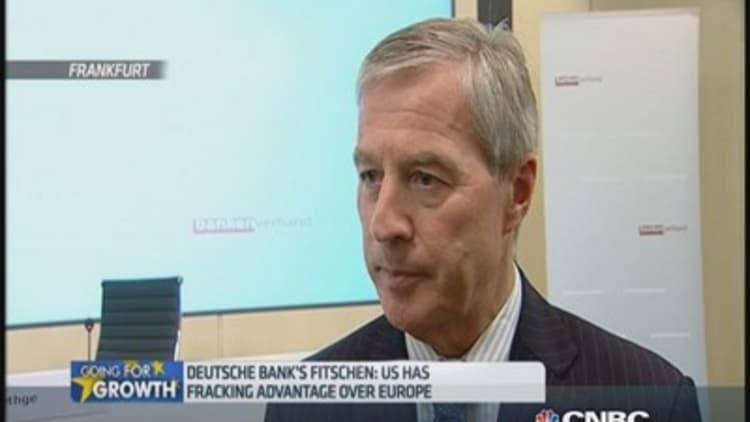
High energy prices and resistance to fracking are two key reasons why Europe's economic recovery has lagged the U.S., the joint head of Germany's largest bank by assets told CNBC.
Jürgen Fitschen, co-chief executive of Deutsche Bank, said bureaucracy, education and productivity partially explained Europe's difficulties, but laid much of the blame on the cost of energy in the region.
"It is undeniable that Europe overall faces one very big disadvantage: that is cost of energy," Fitschen, who is also head of the German Bankers Association, told CNBC in Frankfurt on Monday.
"That (low energy prices) has been one of the factors that have stimulated the euphoria and the growth momentum in the States. That is something that cannot be replicated easily in Europe."
Including taxes, domestic U.S. gas prices fell by 2.2 percent in 2013 on the previous year to 2.18 U.K. pence (3 U.S. cents) per kilowatt hour (kWh), according to the International Energy Agency.
By comparison, Spanish domestic prices rose by 7.8 percent to 6.93 pence and British prices rose by 7.7 percent to 4.90 pence respectively.
Fitschen said that the shale gas revolution helped explain why U.S. energy prices had fallen.
The U.S. has embraced fracking—or hydraulic fracturing—for shale, which has helped lead a revival in some manufacturing industries and helped the country become less reliant on oil and gas imports.
Read MoreFracking spurs a rust belt rebound in manufacturing
However, the process has met with far more opposition in Europe, due to environmental concerns relating to possible seismic tremors and a risk to water supplies.
Read MoreOhio links fracking to tremors
"You are aware that Europe is negative on fracking—that has been part of the solution in the States," said Fitschen.
"So we have to address this aspect, to make sure that the desirable change in our economic mix can be established, without neglecting the ecological aspects that we still keep in high regard."




